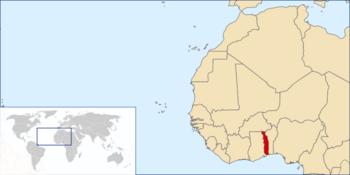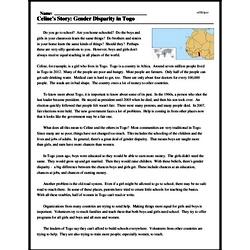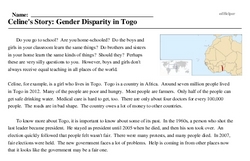Celine's Story: Gender Disparity in Togo
Do you go to school? Are you home-schooled? Do the boys and girls in your classroom learn the same things? Do brothers and sisters in your home learn the same kinds of things? Should they? Perhaps these are very silly questions to you. However, boys and girls don't always receive equal teaching in all places of the world.
Celine, for example, is a girl who lives in Togo. Togo is a country in Africa. Around seven million people lived in Togo in 2012. Many of the people are poor and hungry. Most people are farmers. Only half of the people can get safe drinking water. Medical care is hard to get, too. There are only about four doctors for every 100,000 people. The roads are in bad shape. The country owes a lot of money to other countries.
To know more about Togo, it is important to know about some of its past. In the 1960s, a person who shot the last leader became president. He stayed as president until 2005 when he died, and then his son took over. An election quickly followed that people felt wasn't fair. There were many protests, and many people died. In 2007, fair elections were held. The new government faces a lot of problems. Help is coming in from other places now that it looks like the government may be a fair one.
What does all this mean to Celine and the others in Togo? Most communities are very traditional in Togo. Since many are so poor, things have not changed too much. This includes the schooling of the children and the lives and jobs of adults. In general, there's a great deal of gender disparity. That means boys are taught more than girls, and men have more chances than women.




